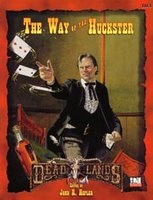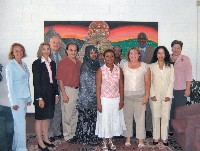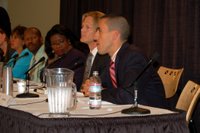
many big-name and medium-name academics are charging
large speaking fees. when local grad students invited a prominent (non-sociology) professor to campus for a talk, they were told it would cost $20,000 plus expenses. since s/he ain't flying coach, the expenses might cost an additional $5,000. around here, that's about a year's worth of support for a grad student and
three years of undergrad tuition. in my view, demanding such fees is an absurd
abuse of the academic star system and only suckers would
pay such fees.
here is how critics of academics (including myself, of course) might see big speaking fees:
1.
individuals grabbing credit for group accomplishments. unlike novelists who might conceive and execute projects on their own, most of us rely on others to do much of the real work on our projects. dozens of students and thousands of research subjects often assist in our research. so, where's
their cut of the $20,000? they don't get a sniff of it.
2.
feeding at the public trough. few of us could gain much private recognition without huge
public investments. for example, the states of minnesota and wisconsin subsidized my education; the national science foundation, the department of justice, and the national institutes of health have supported my work; and, the university of minnesota has paid me a steady and generous salary throughout my career. so the taxpayers and students are triple-gouged by (1) the fee they must pay to speakers; (2) the lack of return on their previous investments; and, (3) the lost time i take for personal profit when i could be teaching or doing other work for the minnversity.
3.
profiting from misery. shouldn't we feel conflicted and rotten whenever we take a limousine to a poverty conference or step over a homeless kid on the way to a sumptuous hotel? those of us who do social-problemsy research should really know better, unless we have such an outsized sense of personal entitlement that we don't even notice the contradiction.
4.
nothing intellectual about it. such fees are for celebrities rather than scientists, so these folks aren't brought in for anything resembling a "serious" research talk. i'm all for popularizing high-end research, but big public talks should help fulfill the mission of teaching and disseminating findings rather than the mission of generating a supplementary income stream.
5.
tenured professors already get paid. non-academics who must make a living giving talks and writing books likely need hefty speakers fees. i know some brilliant free-lance journalists who live article-to-article and supplement when and where they can. but big-shot tenured professors can already rely upon their six-figure academic-year salaries. forever.
6.
lousy investment. our potential visitor was
not a major political or cultural figure, either, who might arguably return $25k in attention and resources or even prestige to the minnversity. the minnversity
may have gotten their money's worth in bringing in colin powell, salmon rushdie, and other non-academics to campus this year, but that's a tough argument to make for just another professor from a peer institution.
7.
they'd be ashamed. if i blogged the names and fees of people who have turned down invitations for monetary reasons, they'd surely want to sue me. imagine if your peers read something like this:
well, we invited uggen but there's just no way. his agent said he normally charges $10k, but would give us his special discount fee of $8,500. he's already got offers for $9,000 at the mall of america business college and $9,500 at the boat show. when we told him we only had $5,000, he said it just wasn't worth his time.
8.
rubes, suckers, and marks. relative to small unranked institutions, fees are often much
lower for well-endowed private universities such as stanford, harvard, and chicago. some bigshots
only address the "rubes in flyoverland" when paid very handsomely, since there is no compensating gain in prestige. i can get a little cranky when a visitor sees the minnversity as anything other than a great public research university. paying fees that harvard
wouldn't have to pay puts me into the position of a rube, a sucker, a mark, and (okay, i'll say it) a john.
9.
even a high-end $20,000-per-night escort is still a ... i wouldn't push the analogy too far, but there's a word for people who seek monetary compensation for their kind attentions.
10.
no accountability. when deans and department chairs put $20,000 into a new initiative, we like to know what happens to it. did it serve as seed money to launch a new initiative? did a publication result? was it used to further a teaching or service mission? sometimes expenditures turn out to be "blind alleys" that don't pan out, of course, but at least the recipient is accountable and there's a reasonable chance of an intellectual payoff. for a speaker series, there are plenty of non-$20k visitors doing the kind of exciting work that generates great ideas and intellectual exchange.
i'm not suggesting that everyone should put their honoraria into a
felon fund or that professors shouldn't be compensated for their time. i can certainly understand why busy academics cannot accept every invitation to travel and speak. but wouldn't, say, $500 or $1000 be ample compensation? choosing academic invitations based solely on ability to pay any
more than that doesn't pass the smell test. i guarantee that if you devote half your honoraria to an organization or a cause related to your research, you'll feel a whole lot better about taking the balance of the money.
 i'm in nyc for a punishment conference at the new school. after today's academic sessions, richard gere and carey lowell offered a dramatic reading of prison writings.
i'm in nyc for a punishment conference at the new school. after today's academic sessions, richard gere and carey lowell offered a dramatic reading of prison writings.






